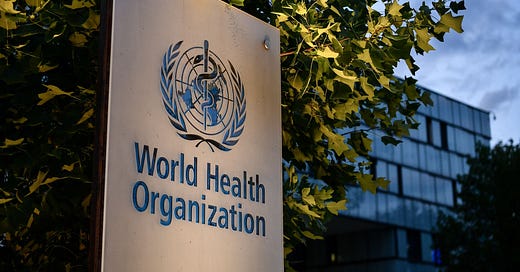Health is More Than Just Not Sick
Lessons from medieval Arabic translators and a department of the United Nations.

Dear Healthy Jew,
In a few days, Jews all over the world will celebrate Rosh Hashana - the day that God completed Creation by breathing life into that incredibly good and bad being called human.
Now is the time to begin pondering our beginnings - as people, Jews, and, in our little corner of the internet, as Healthy Jews.
I often share with you Maimonides’ teaching that health means balance. And I just as often share Maimonides’ other teaching that choosing health on purpose is what makes us genuinely human.
Those ideas are true, important, and profound. But in the coming weeks, we’re going to dig deeper at the roots of health and sickness of body, mind, and spirit. We’re going to search for the simplest definitions, the first beginnings.
The Poet and the Scholar
Eight-hundred years ago, there was a furious clash between two of the late Medieval age’s foremost translators of Arabic texts into Hebrew, centered around the appropriate method of translating Maimonides’ writings.
Rabbi Yehuda al Charizi, a traveling poet, churned some of Maimonides’ Arabic works into beautiful Hebrew literature, but lacked the necessary philosophical background to appreciate their depth and precision.
His antagonist, Rabbi Shmuel Ibn Tibbon, hailed from a family of serious students of Torah and philosophy who specialized in meticulous - and unwieldy - translations of medieval Arabic texts into Hebrew.
Both scholars translated Maimonides’ Guide to the Perplexed, and both appended glossaries to explain philosophical concepts foreign to the average reader. Al-Charizi went first, so Ibn Tibbon had the last word, which he used to fiercely denounce his colleague, providing posterity with a window into the mind of a medieval academic frustrated with poets who pose as scholars.
One of their notable disputes concerned the Hebrew word emes, commonly translated as truth.
What is truth?
The poet wrote that emes is the absence of sheker, or falsehood. The scholar fulminated that it’s improper to define an asset by its deficiency and something that exists by its lack. Good point, no?
Healthy or Only Not-Sick?
I often think of this medieval conflict when trying to define the health we’re seeking here at Healthy Jew, a health that reaches body, heart, mind, and spirit.
What does health mean? The standard dictionary definition of health as not sick (look it up) is woefully insufficient, because it defines a vital concept as the lack of its opposite. Rabbi Ibn Tibbon would never go for that.
Perhaps the World Health Organization wished to avoid Ibn Tibbon’s wrath when they decreed back in 1948:
Health is a state of complete physical, mental and social well-being, and not merely the absence of disease or infirmity.
One of the key words of this statement, which has been the topic of much discussion and controversy (this is an arm of the United Nations, after all), is “complete,” implying that “well-being” translates into “health” only when boosted to wholeness. If something is missing in a person’s well-being – no matter how small – he can’t be regarded as healthy, even if his body doesn’t contain any specific pathologies.1
In other words, health implies that life comes in two varieties: complete and defective. Health isn’t automatically included in the gift of life but is a second dimension of life which living beings might receive – and might not. Life begins, at least conceptually, incomplete, and health is the positive asset which makes it whole.
In the coming weeks, we’ll take a deep look at this wholeness of life called health, and try to appreciate how it’s a positively existing thing that’s worth seeking.
Thank you for reading Healthy Jew.
Here are 2 great paths to continue the journey:
Also check out this intro and index to explore hundreds of posts about our 3 Healthy Jew topics: Wellness with Wisdom, Land of Life (Israel), and Sensible Spirituality.
Finally, always feel free to reach out here with any comments, questions, or complaints:
I look forward to hearing from you!
Be well,
Rabbi Shmuel Chaim Naiman
https://www.ncbi.nlm.nih.gov/pmc/articles/PMC6320447/






